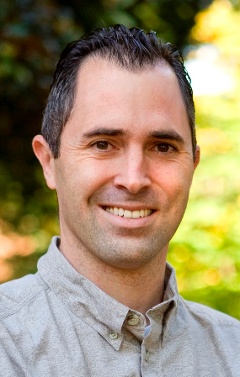University Libraries Open Access Week features lecture by Center for Open Science co-founder

Brian Nosek, professor of psychology at the University of Virginia and co-founder of the Center for Open Science, will deliver the keynote address for University Libraries Open Access Week.
His lecture, “Scientific utopia: Improving the openness and reproducibility of research,” will highlight several issues in publishing scientific studies and identify ways to improve reproducibility and accelerate the scientific process.
The event, to be held on Monday, Oct. 20, at 5:30 p.m. in Room 30, Pamplin Hall, is free and open to the public.
The lecture is sponsored by the University Libraries, the College of Science, and the Department of Psychology.
In support of International Open Access Week, Open Access Week at Virginia Tech will highlight the growing movement towards public access to research and scholarship.
“There are many groups across the state working on open knowledge," said Nosek, "and I hope that we can foster a strong community for the mid-Atlantic region.”
Nosek is co-founder and director of the Center for Open Science, an organization that aims to increase openness, integrity, and reproducibility of scientific research. He received early career awards from the International Social Cognition Network and the Society for the Psychological Study of Social Issues, and he also co-founded Project Implicit, an Internet-based multi-university collaboration of research and education about thoughts and feelings that exist outside of awareness or control.
“Dr. Nosek’s talk is relevant to anyone who conducts or consumes scientific research – and that is just about everyone,” said Robert Stephens, professor and chair of the Department of Psychology in the College of Science. “He brings attention to the way in which the current incentives to publish favor results that make headlines. Unfortunately, many of those headlines are false.”
At the Center for Open Science, Nosek strives to blend science and technology to support transparency and inclusivity throughout research processes.
“Nosek offers important ideas on how to improve the scientific enterprise and increase the reproducibility of published findings - and that’s good for everyone,” added Stephens.
Open Access Week at Virginia Tech will offer the university community several other free workshops and discussions, including:
- Tuesday, Oct. 21 (5:30 p.m., Newman Library Multipurpose Room) Panel discussion: Virginia Tech faculty and students share perspectives on open access and take questions from the audience.
- Wednesday, Oct. 22 (10 a.m., 1100 Torgersen Hall) Workshop: Those writing an article for a scholarly peer-reviewed journal may receive $1,500 to publish it in an open access journal. This session will cover the requirements and award criteria and guide participants through a real or practice fund request with the fund manager.
- Thursday, Oct. 23 (3 p.m., Newman Library Multipurpose Room): Workshop on reproducible research practices. In science, reproducibility is defined as the ability to redo an experiment and achieve the same results. However, researchers have noticed increasing problems recreating experiments used in some of today's most important studies. Ever worry about false positive results in your research or wonder how you can increase the reproducibility of your work? Hosted by the Center for Open Science.
For a full listing of events, visit the 2014 Open Access Week event page.




